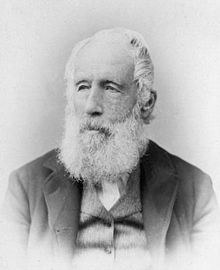John Bennet Lawes
| Sir John Bennet Lawes, Bt | |
|---|---|
 |
|
| Born | 28 December 1814 Harpenden near St Albans, Hertfordshire |
| Died | 31 August 1900 (aged 85) |
| Awards | Albert Medal (1893) |
Sir John Bennet Lawes, 1st Baronet, FRS (28 December 1814 – 31 August 1900) was an English entrepreneur and agricultural scientist. He founded an experimental farm at his home at Rothamsted Manor that eventually became the Rothamsted Experimental Station, where he developed a superphosphate that would mark the beginnings of the chemical fertilizer industry.
John Bennet Lawes was born at Rothamsted in modern-day Harpenden near St Albans, Hertfordshire, on 28 December 1814, the only son of John Bennet Lawes, owner of the Rothamsted estate and lord of the manor of Rothamsted. His father died when he was eight years old, so he was raised mostly by his mother Marianne. He was educated at Eton College and at Brasenose College, Oxford, although he didn't graduate. Even before leaving Oxford in 1832, Lawes had begun to interest himself in growing various medicinal plants on the Rothamsted estates, which he inherited from his father upon his death in 1822. Around 1837, he began to experiment on the effects of various manures on plants growing in pots, and a year or two later the experiments were extended to crops in the field in order to free farmers from relying on animals to produce fertilizer. In 1839, an ostrich belonging to him escaped Rothamsted and caused a bit of property damage, although the only person it hurt was the first one to try and capture it. In 1842, he patented a manure formed by treating phosphates with sulphuric acid, and thus initiated the artificial manure industry. In the succeeding year he enlisted the services of Joseph Henry Gilbert, with whom he experimented for more than half a century in raising crops and feeding animals, activities which have rendered Rothamsted famous to scientific agriculturists. In 1854, he was elected a Fellow of the Royal Society, which in 1867 bestowed a Royal Medal on Lawes and Gilbert jointly, and in 1882 he was awarded the title of baronet. He died in 1900, passing his manor to his son Charles, and is buried in the churchyard of St Nicholas Church, Harpenden with his wife Caroline (née Fountaine) Lawes (1822-1895).
...
Wikipedia
